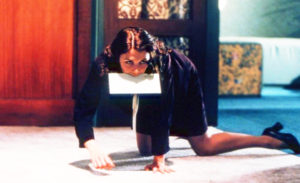Should porn be banned? The question would have seemed a perfectly reasonable one during the post-1968 “Porn Wars”, when prominent feminists such as Andrea Dworkin and Catharine MacKinnon drafted anti-pornography ordinances that passed in major cities — before being struck down as violations of free speech. Seen as dependent on the physical exploitation of often poor women, and a core driver of violence against them, pornography was one of the National Organisation for Women’s “Big Four” issues. In Robin Morgan’s words: “Pornography is the theory, and rape is the practice.”
But the days when feminists were largely against porn are a distant memory. With the rise of the Christian Right in the Eighties — and the rise of home video — so-called “sex-positive feminism” won the day. As a popular Ellen Willis line went: “In practice, attempts to sort out good erotica from bad porn inevitably comes down to ‘What turns me on is erotic; what turns you on is pornographic.’” In this view, pornography wasn’t about social issues such as the eroticisation of violence against women or their submission, economic and physical. It was just about, well, “what turns you on”.
This view is a pretty simplistic one. As Amia Srinivasan observes in The Right to Sex, it’s not like our desires come inborn, just waiting for their validation and release by streaming. Instead, porn sites — algorithmically overdetermined, like everything else dependent on online ad sales — push site-goers to eroticise whatever’s getting the most hits in their area. Most often, it’s pretty harrowing stuff.
One might object to this state of affairs. The porn industry is worth almost $100 billion worldwide; it is the way most boys and many girls are first exposed to sex in the developed world, and often at preteen ages. Performers are rampantly abused, and women mostly age out by their twenties. Many posit a connection between porn consumption and sexual dysfunction and body dysmorphia. Only the most naive would deny that women feel pressured to accommodate an androcentric ideal of behaviour, and that pornography partakes of and amplifies that pressure.
But despite a recent spate of critiques of “sex-positive” liberal feminism, few today really condemn porn. Co-opted and defanged like so many countercultural movements of the Sixties, feminism has now generally settled into uncritical embrace of choice, wary to articulate any theory of good, bad, or even fair sex beyond the presence of “consent”. This liberal, legalistic framework is something of a fiction, of course; much as the underdogs in capitalism are treated as giving free and informed consent even under the most dire economic duress, women today are treated as giving consent even when their wishes are as minimised and obscured as ever. But the imperative of sex-positive feminism is to not question women’s desires, but instead take them at their word.
Hence the strange case of Pleasure, the feature debut of Swedish director Ninja Thyberg, for which I had high hopes: it is perhaps the most widely released film about porn to actually go “behind the scenes”, hand sanitiser and all. By delving into the actual production of all those mountains of mysterious videos, Thyberg handles a subject ripe for a critical perspective. As lead Sofia Kappel told the Guardian, “I think the porn industry as a subject is very interesting since it’s very present in our lives but we don’t talk about it. We act like it doesn’t exist.”
She’s right. But a promising subject is no guarantee of artistic success. Pleasure, praised to the sky by major critics, is less a work of art than a piece of self-defeating propaganda. It is an attempt at a pro-porn feminist flick that is so violent, so thin, and so degrading for creators and viewers alike, that Thyberg may have inadvertently created one of the greatest arguments yet against so-called sex-positive feminism.
Thyberg is a former anti-porn activist, and Pleasure is an adaptation of her 2013 Cannes short portraying the violent pressuring of a woman performer into an extreme act. As one might expect, its plot reads like an after-school special. Bella Cherry, an attractive 19-year-old Swede with virtually no backstory, personality, or desires, comes to California to enter the porn industry. In short order, she’s pressured into BDSM and then an even more extreme act before, in her own words, being “raped for hours” and finally quasi-assaulting a more attractive rival. She ends up so sickened with herself she crawls out of her limo onto a crowded LA freeway.
But as she has exhaustingly demonstrated on the press circuit, Thyberg has squarely imbibed the dogma of non-judgment. Explaining to the Guardian that she’s changed from anti-porn to judgment-free, she says, “The things that [Bella’s] going through that are bad in the film don’t have anything to do with having sex on camera.” In a New York Times profile, Thyberg declares that “Bad things happen, but it’s not because people are having sex on camera… Abuses of power exist in all workplaces.” To HuffPost: “[Bella is] sometimes the victim or in the bottom of some kind of hierarchy, but sometimes she’s also the one in the top.”
Reviewers have praised Pleasure as a triumph of even-handedness. In its glowing piece, titled “She’s a Go-Getter”, the New York Times tells us that “women make porn and women watch it, and for different reasons, including because they like it. Because it’s their choice.” The LA Times similarly observes that “Thyberg does well to withhold judgment, approaching the porn industry not as an evil.” Mechanically drawing on the word bank of liberal feminism (“affirming”, “sex-positive”, “consent”, “non-judgmental”), NPR praises a scene where a female director has the lead tied up in rope, ball-gagged, and beaten by her easy-going male costar.
But no one unfitted with blinders could see this as anything other than an anti-porn film. Pleasure’s script is a string of feminist clichés set against scenes of violence, exploitation, and entrapment that collapse the shaky, pro-porn myth of free choice they rest on. Indeed, one wonders whether Thyberg may have been pressured to market the film for a sex-positive age.
In Bella’s first shoot, she meets the counterpart to her “teen” role — a fat, much older man, in what’s essentially a babysitter scene — and while preparing in the bathroom, has a panic attack. The director and crew tell her that she simply has “stage fright” and that “when you’re doing anything for the first time, it’s normal to feel nervous”. They successfully pressure her back on stage. Her final, post-coital triumph involves smearing the desideratum all over her face and posting selfies to Instagram with the hashtag #proudslut. Driving her back to her model house, a male porn star asks her how she got into this industry. “Well, my dad raped me…” she begins to joke in remarkably bad taste, before he tells her to shut up. Then she provides the right answer: “I just want to fuck!”
But for all her claims to concupiscence, neither she nor any other character in this film has any amorous or even amicable relationships: they have sex on camera, in scenes that, from that first one on, are consistently horrifying, and none of which seems entirely “voluntary”. If Bella really just wants to have sex, as she repeats again and again, why does she freeze up before every scene? And why does her vision go fuzzy during every shoot, even the “feminist” one? How, after she is “raped for hours”, can she possibly be saying to her agent that she does porn because “it’s a lot of fun”? How does her triumph over a prettier rival consist of sexually brutalising her? How can the conclusion of a pro-porn film involve the protagonist jumping out a limo in shame?
How is this not satire?
Despite herself, Thyberg has made an allegory for the central contradiction of “sex work is work”: it may be work, but sex is also the main human conduit for intimacy and mutual desire, and its alienation in a free market makes it all the more difficult for one to say what they really feel or desire. Bella’s only consolation is the hope of online stardom, which doesn’t seem to be coming. All she’s done is become a monster.
In her interviews, Thyberg has said that the film was about how abuses in porn stem from capitalism and patriarchy. But is a heterosexual BDSM scene with a female tied up and gagged, so long as it’s filmed by a woman, really all feminism can aspire to?
To Thyberg’s credit, she does emphasise the more craven side of the industry: the pressure to go extreme to get bookings, the pressure to follow through to get paid, the way Bella’s darker-skinned roommate is dismissed as “trailer trash” and abused on set. But in her attempts to withhold judgment, Thyberg has landed in unsettling and unsatisfying territory: there are clearly attempts to make porn seem fun — that Instagram post, that nice female director, that pool party — but the bits of economic reality she allows in reveal those touches as the hollow ornaments they are. “Abuses of power happen in all workplaces”, but in no other industry but prostitution do people’s rent cheques depend on a woman submitting to violent sex acts with strangers, driven by the ever-more-extreme tastes of audiences at home.
Bella Cherry doesn’t have any trauma, apparently. But nor does she have any joy, any desire, or, after the first few minutes, much of any hope. Ultimately, Pleasure is unable or unwilling to develop a positive theory of why she wants any of this, or why anyone wants any of this. Thyberg has said that she wanted to show what Bella “gets out” of porn; to show the moments where she’s on “top”. But even at her highest moment, she is merely a blank face, insecure and overwhelmed, sticking her tongue out at her iPhone as strangers wash up a few feet away. And that is its own judgment.
Disclaimer
Some of the posts we share are controversial and we do not necessarily agree with them in the whole extend. Sometimes we agree with the content or part of it but we do not agree with the narration or language. Nevertheless we find them somehow interesting, valuable and/or informative or we share them, because we strongly believe in freedom of speech, free press and journalism. We strongly encourage you to have a critical approach to all the content, do your own research and analysis to build your own opinion.
We would be glad to have your feedback.
Source: UnHerd Read the original article here: https://unherd.com





